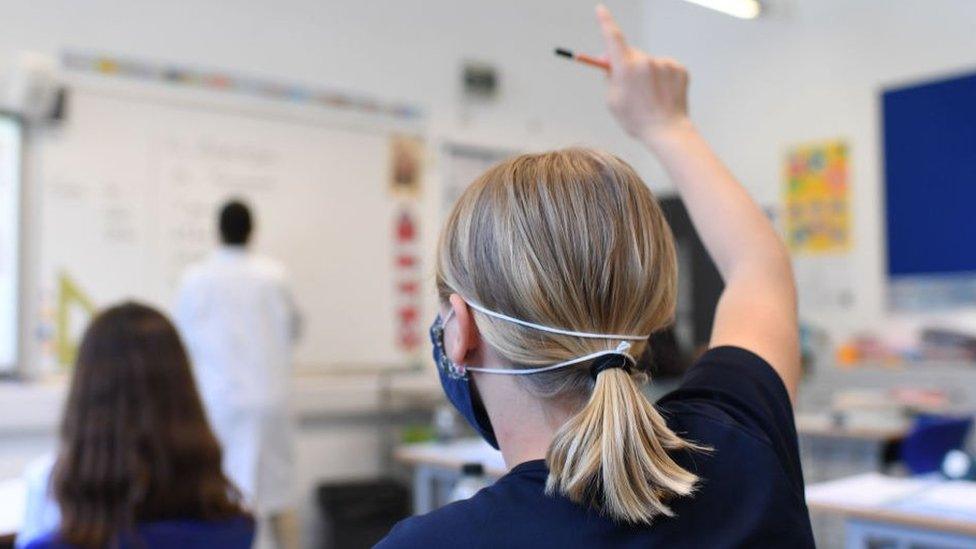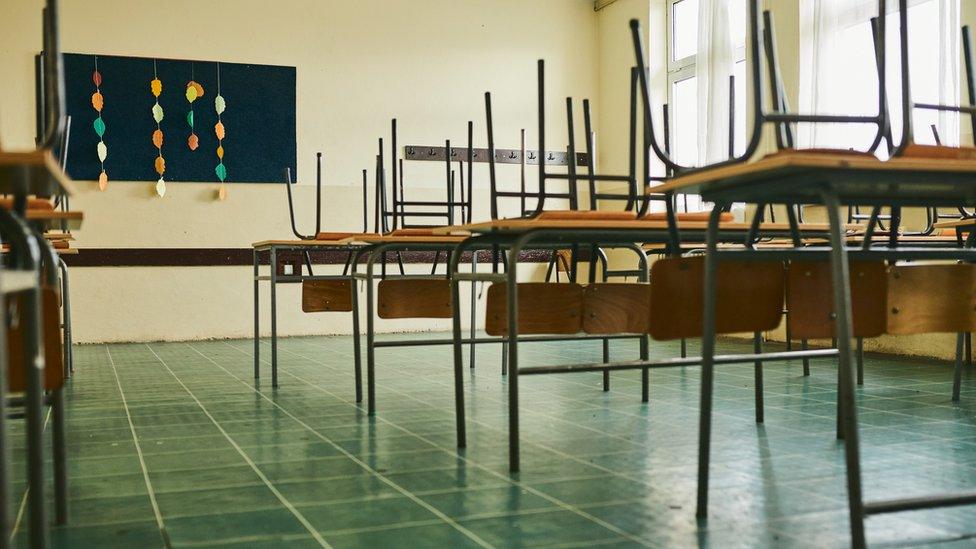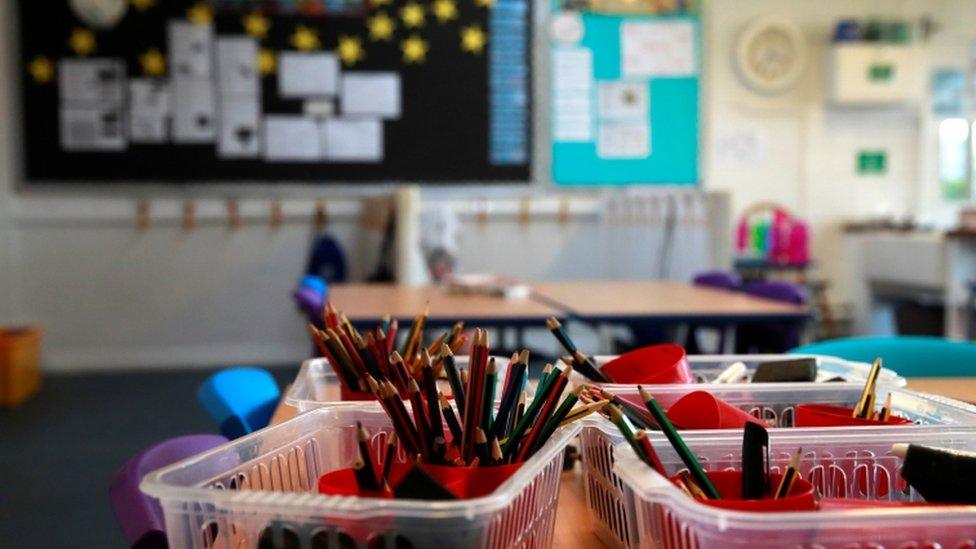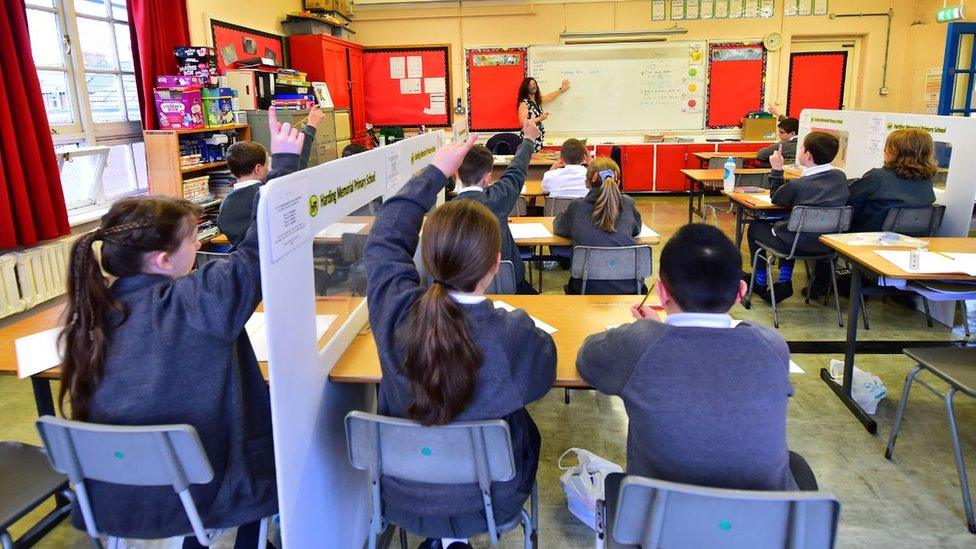Covid-19: Schools not a 'major source' of transmission
- Published
- comments
'Phased approach needed for school reopening'
Schools - including special schools - are not a major source of transmission of coronavirus, the Public Health Agency (PHA) has said.
The comments were made in a PHA presentation to education officials and some school principals last week, seen by BBC News NI.
It said that school transmission "does occur but tends to be small scale".
The Northern Ireland Executive is yet to decide if some or all pupils can return to school on Monday 8 March.
On Monday, four more Covid-related deaths were announced by the Department of Health, bringing its total since the start of the pandemic to 2,000.
In Scotland and Wales, the youngest primary school pupils are due to go back to class on 22 February.
On Sunday, Dr Tom Black, the chair of the British Medical Association (BMA) in Northern Ireland, said he was hopeful primary schools could reopen on 8 March, external.
But he said it would be a "big ask" to reopen post-primary schools on that date.
A number of meetings have been taking place between education officials, some principals and union representatives ahead of any decision on schools by the NI Executive, BBC News NI understands.
As part of those meetings, a presentation on Covid-19 in schools from the PHA was given.
'Small-scale spread'
It shows that 190 out of 194 post-primaries have had at least one case of coronavirus in the 2020-21 school year and almost 70% of 792 primary schools.
However, the PHA presentation indicated that schools were not a major source of transmission nor a "major driver" of the second wave of Covid-19.
Instead, cases in schools "reflect community prevalence" and as cases fall in the wider community "we expect to see reducing numbers of positive cases in schools", said the PHA.
While school transmission does occur, the presentation said, it "tends to be small scale".
According to the PHA, children were less affected by Covid-19 in "prevalence and severity".

The Public Health Agency have said measures to prevent the spread of the virus in classrooms have been effective
While the agency warns that new coronavirus variants are more infectious in general across all age groups, it said they are not worse in children.
The PHA presentation said that non-pharmacological interventions in schools were effective.
These include social distancing, hand and respiratory hygiene, children kept in class "bubbles", cleaning and the circulation of fresh air.
Dr Joanne McClean, from the PHA, said that the presentation given to reassure staff at special schools that "while schools are a source of transmission" they were not at high risk from working in a classroom.
However, she added that the transmission risk in schools was not limited to classrooms, where social distancing and other measures are enforced, but that interactions in and around schools had to be considered.
Schools 'have done huge amount of work'
"We know that schools add to that R rate and we're not trying to argue with that," she said on The Stephen Nolan Show.
"We've all been to schools around entry and exit time - it's around the social gathering that takes place after that."
Dr McClean said the risk in classrooms can be controlled by schools and that they had "done a huge amount of work" in introducing measures to mitigate transmission.
But the "bit that goes on outside the class", such as in the morning and afternoon when children are arriving and leaving, is more difficult.
One principal told BBC Radio Foyle that schools should return as soon as possible.
"Staff are on their knees at the moment," said Colin Torrens, principal of Lisnagelvin Primary School in Londonderry.
"Online learning takes an awful lot more preparation, my staff are working from 08:30 right through, some are telling me they are still working at midnight.
He added: "Staff want back to school because the pressure they are under at the moment is tremendous, and I think our children need to get back to school."
Special schools have remained open to all pupils since the start of January but the vast majority of pupils in pre-schools, primary schools and post-primaries have been learning remotely.
The National Education Union has previously said that a full return to school by all pupils "may not be possible for some time".
The NI Executive is expected to discuss the return of pupils to schools at their meeting on 18 February but it is not clear if ministers will make a final decision on an 8 March return at that point.
- Published28 January 2021

- Published14 February 2021

- Published4 February 2021
